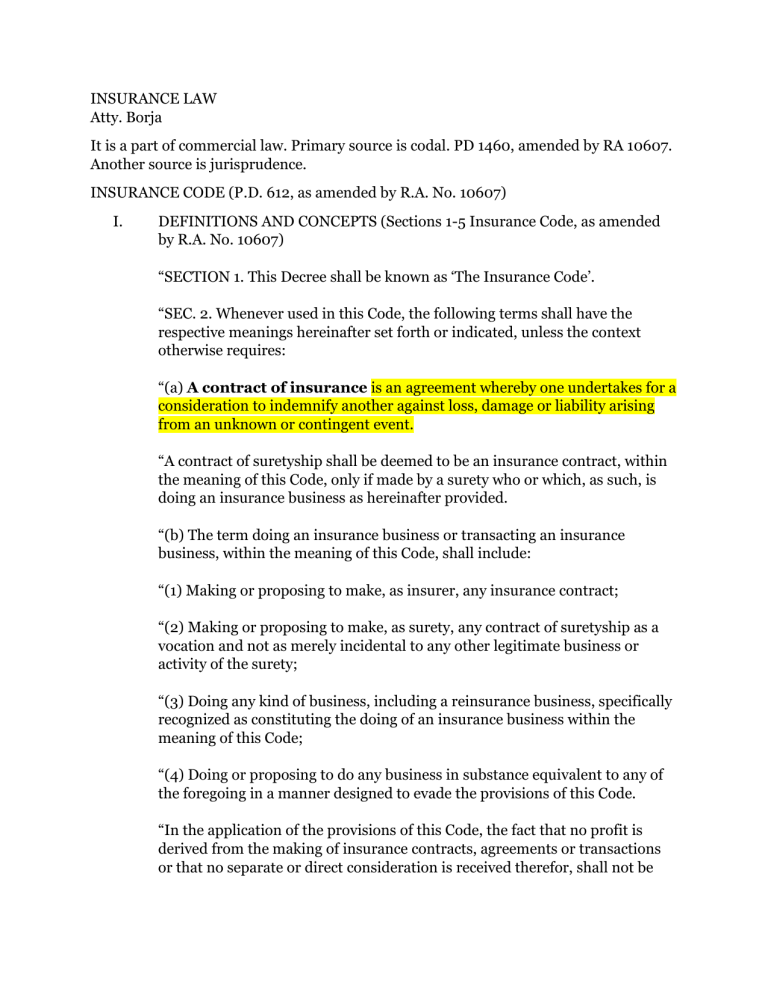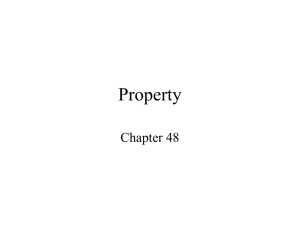
INSURANCE LAW Atty. Borja It is a part of commercial law. Primary source is codal. PD 1460, amended by RA 10607. Another source is jurisprudence. INSURANCE CODE (P.D. 612, as amended by R.A. No. 10607) I. DEFINITIONS AND CONCEPTS (Sections 1-5 Insurance Code, as amended by R.A. No. 10607) “SECTION 1. This Decree shall be known as ‘The Insurance Code’. “SEC. 2. Whenever used in this Code, the following terms shall have the respective meanings hereinafter set forth or indicated, unless the context otherwise requires: “(a) A contract of insurance is an agreement whereby one undertakes for a consideration to indemnify another against loss, damage or liability arising from an unknown or contingent event. “A contract of suretyship shall be deemed to be an insurance contract, within the meaning of this Code, only if made by a surety who or which, as such, is doing an insurance business as hereinafter provided. “(b) The term doing an insurance business or transacting an insurance business, within the meaning of this Code, shall include: “(1) Making or proposing to make, as insurer, any insurance contract; “(2) Making or proposing to make, as surety, any contract of suretyship as a vocation and not as merely incidental to any other legitimate business or activity of the surety; “(3) Doing any kind of business, including a reinsurance business, specifically recognized as constituting the doing of an insurance business within the meaning of this Code; “(4) Doing or proposing to do any business in substance equivalent to any of the foregoing in a manner designed to evade the provisions of this Code. “In the application of the provisions of this Code, the fact that no profit is derived from the making of insurance contracts, agreements or transactions or that no separate or direct consideration is received therefor, shall not be deemed conclusive to show that the making thereof does not constitute the doing or transacting of an insurance business. “(c) As used in this Code, the term Commissioner means the Insurance Commissioner. “SEC. 3. Any contingent or unknown event, whether past or future, which may damnify a person having an insurable interest, or create a liability against him, may be insured against, subject to the provisions of this chapter. “The consent of the spouse is not necessary for the validity of an insurance policy taken out by a married person on his or her life or that of his or her children. “All rights, title and interest in the policy of insurance taken out by an original owner on the life or health of the person insured shall automatically vest in the latter upon the death of the original owner, unless otherwise provided for in the policy. “SEC. 4. The preceding section does not authorize an insurance for or against the drawing of any lottery, or for or against any chance or ticket in a lottery drawing a prize. “SEC. 5. All kinds of insurance are subject to the provisions of this chapter so far as the provisions can apply. 1. “Contract of Insurance” (Sec. 2) Philamcare Health Systems vs. CA Important matters: Section 2 (1) of the Insurance Code defines a contract of insurance as an agreement whereby one undertakes for a consideration to indemnify another against loss, damage or liability arising from an unknown or contingent event. An insurance contract exists where the following elements concur: 1. The insured has an insurable interest; 2. The insured is subject to a risk of loss by the happening of the designated peril; 3. The insurer assumes the risk; 4. Such assumption of risk is part of a general scheme to distribute actual losses among a large group of persons bearing a similar risk; and 5. In consideration of the insurer’s promise, the insured pays a premium. Section 3 of the Insurance Code states that any contingent or unknown event, whether past or future, which may damnify a person having an insurable interest against him, may be insured against. Every person has an insurable interest in the life and health of himself. Section 10 provides: Every person has an insurable interest in the life and health: (1) of himself, of his spouse and of his children; (2) of any person on whom he depends wholly or in part for education or support, or in whom he has a pecuniary interest; (3) of any person under a legal obligation to him for the payment of money, respecting property or service, of which death or illness might delay or prevent the performance; and (4) of any person upon whose life any estate or interest vested in him depends. In the case at bar, the insurable interest of respondent’s husband in obtaining the health care agreement was his own health. The health care agreement was in the nature of non-life insurance, which is primarily a contract of indemnity. Where matters of opinion or judgment are called for, answers made in good faith and without intent to deceive will not avoid a policy even though they are untrue. Although false, a representation of the expectation, intention, belief, opinion, or judgment of the insured will not avoid the policy if there is no actual fraud in inducing the acceptance of the risk, or its acceptance at a lower rate of premium, and this is likewise the rule although the statement is material to the risk, if the statement is obviously of the foregoing character, since in such case the insurer is not justified in relying upon such statement, but is obligated to make further inquiry. The fraudulent intent on the part of the insured must be established to warrant rescission of the insurance contract. Concealment as a defense for the health care provider or insurer to avoid liability is an affirmative defense and the duty to establish such defense by satisfactory and convincing evidence rests upon the provider or insurer. Under Section 27 of the Insurance Code, "a concealment entitles the injured party to rescind a contract of insurance." The right to rescind should be exercised previous to the commencement of an action on the contract. In this case, no rescission was made. Besides, the cancellation of health care agreements as in insurance policies require the concurrence of the following conditions: 1. Prior notice of cancellation to insured; 2. Notice must be based on the occurrence after effective date of the policy of one or more of the grounds mentioned; 3. Must be in writing, mailed or delivered to the insured at the address shown in the policy; 4. Must state the grounds relied upon provided in Section 64 of the Insurance Code and upon request of insured, to furnish facts on which cancellation is based. None of the above pre-conditions was fulfilled in this case. Being a contract of adhesion, the terms of an insurance contract are to be construed strictly against the party which prepared the contract – the insurer.20 By reason of the exclusive control of the insurance company over the terms and phraseology of the insurance contract, ambiguity must be strictly interpreted against the insurer and liberally in favor of the insured, especially to avoid forfeiture. This is equally applicable to Health Care Agreements. The health care agreement is in the nature of a contract of indemnity. Hence, payment should be made to the party who incurred the expenses. It is not controverted that respondent paid all the hospital and medical expenses. She is therefore entitled to reimbursement. 2. Events covered by Insurance “SEC. 3. Any contingent or unknown event, whether past or future, which may damnify a person having an insurable interest, or create a liability against him, may be insured against, subject to the provisions of this chapter. “The consent of the spouse is not necessary for the validity of an insurance policy taken out by a married person on his or her life or that of his or her children. “All rights, title and interest in the policy of insurance taken out by an original owner on the life or health of the person insured shall automatically vest in the latter upon the death of the original owner, unless otherwise provided for in the policy. 3. Characteristics of Insurance Contract a. Consensual – It is consensual because it is perfected by the meeting of minds of the parties. (It is also a real & formal contract) b. Voluntary – It is not compulsory and the parties may incorporate such terms and conditions as they may deem convenient. c. Aleatory – It depends upon some contingent event. (It must be uncertain or which is to occur at an indeterminate time) d. Executed – As to the insured after the payment of the premium. e. Executory – On the part of the insurer in the sense that it is not executed until the payment of loss. f. Unilateral – It imposes legal duty only on the insurer who promises to indemnify in case of loss. g. Conditional – It is subject to the conditions the principal one of which is the happening of the event insured against. h. Contract of indemnity – It is because the promise of the insurer is to make good only the loss of the insured. i. Personal – It is a personal contract, each, party having in view the character, credit, and conduct of the other. j. Property in legal contemplation (for life insurance) – Unlike property policies, life insurance policies are generally assignable or transferable like any “chose in action.” (sec. 181) They are in the nature of property and do not represent a personal agreement between the insurer and insured. 4. Interpretation of Insurance Contracts Malayan Insurance Corp vs. CA Rizal Surety vs. CA American Home Assurance vs. Tantuico Enterprises DBP Pool vs. Radio Mindanao Network Gulf Resorts vs. Phil. Charter Insurance Eternal Gardens Memorial Park vs. PHILAMLIFE Keppel Cebu Shipyard vs. Pioneer Insurance Alpha Insurance & Surety vs. Castor II. INSURANCE POLICY (Secs 49-66) (Secs. 233-234) 1. Three types of insurance instruments a. Policy (Sec. 49) “SEC. 49. The written instrument in which a contract of insurance is set forth, is called a policy of insurance. Lucero vs. Insular Life b. Binding Receipt (Sec. 50) “SEC. 50. The policy shall be in printed form which may contain blank spaces; and any word, phrase, clause, mark, sign, symbol, signature, number, or word necessary to complete the contract of insurance shall be written on the blank spaces provided therein. “Any rider, clause, warranty or endorsement purporting to be part of the contract of insurance and which is pasted or attached to said policy is not binding on the insured, unless the descriptive title or name of the rider, clause, warranty or endorsement is also mentioned and written on the blank spaces provided in the policy. “Unless applied for by the insured or owner, any rider, clause, warranty or endorsement issued after the original policy shall be countersigned by the insured or owner, which countersignature shall be taken as his agreement to the contents of such rider, clause, warranty or endorsement. “Notwithstanding the foregoing, the policy may be in electronic form subject to the pertinent provisions of Republic Act No. 8792, otherwise known as the ‘Electronic Commerce Act’ and to such rules and regulations as may be prescribed by the Commissioner. c. Cover Note (Sec. 52) “SEC. 52. Cover notes may be issued to bind insurance temporarily pending the issuance of the policy. Within sixty (60) days after issue of a cover note, a policy shall be issued in lieu thereof, including within its terms the identical insurance bound under the cover note and the premium therefor. “Cover notes may be extended or renewed beyond such sixty (60) days with the written approval of the Commissioner if he determines that such extension is not contrary to and is not for the purpose of violating any provisions of this Code. The Commissioner may promulgate rules and regulations governing such extensions for the purpose of preventing such violations and may by such rules and regulations dispense with the requirement of written approval by him in the case of extension in compliance with such rules and regulations. 2. Rules Relating to Policies a. IC-Approved Forms b. Effect of blanks (Sec. 50) c. Mandatory contents of policy (Sec. 51) d. Mandatory Provisions in Life Insurance Policy (Secs. 233-234) i) 30-day grace period for payment of premium, mandatory in life insurance ii) Incontestability clause iii) Policy constitutes the entire contract between the parties iv) Statement of age of insured when necessary to set the premium and the benefits accruing, and if age stated is false, there will be adjustment of the premium charge v) Reinstatement vi) Policy loan e. When policy executed with an agent/trustee of insured (Sec. 54) principal and real-party-in-interest must be indicated f. Insurance by partner or co-owner (Sec. 55) g. Policy may be framed to inure to benefit of whomsoever (Sec. 57) 3. Unilateral Cancellation of Non-life policy (Sec. 64) a. Cancellation by Insurer (Secs. 64-65) Travellers Insurance vs. CA Agricultural Credit vs. Alpha Insurance b. Cancellation by Insured Paulino vs. Capital Insurance 4. Documentary stamp on insurance policy 5. Variable contracts (Secs. 238-246)



